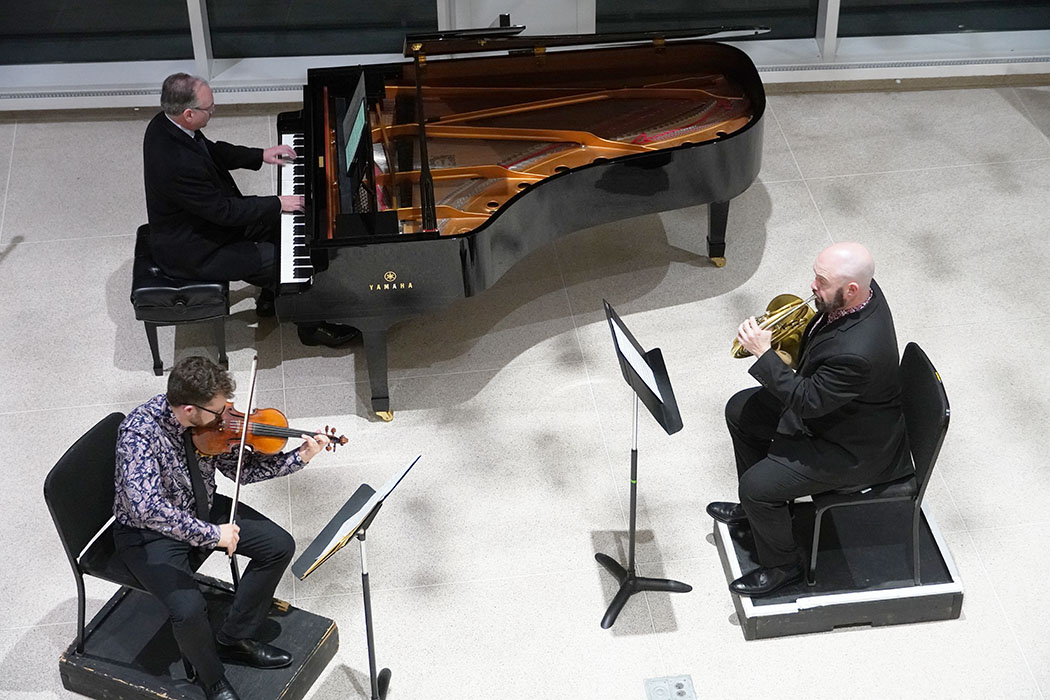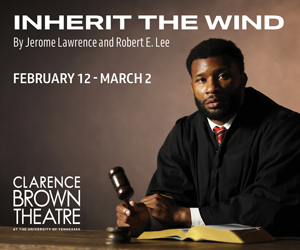Each of the Knoxville Symphony Orchestra’s performance series have their own raison d’etre, from performing the historical and contemporary orchestral repertoire, to the intimacy of small ensembles bringing chamber music to life. In its 11th season of existence, the KSO’s Concertmaster Series has filled a vital programming niche for the orchestra in showcasing the virtuosity of KSO Concertmaster William Shaub, along with some of his colleagues from the orchestra in major small ensemble works of chamber music. The series subtitle, “William Shaub and Friends,” says it all in a cozy, informal way.
Although those “friends” have traditionally been string players and string ensembles, Shaub made an exception in this week’s installment of the popular and entertaining series, inviting KSO Principal Horn, Jeffery Whaley, to join him and series pianist Kevin Class to tackle the intriguing and satisfying Brahms Trio in E-flat Major for Violin, Horn, and Piano, Op. 40. The 1865 work, once rarely played but now feeling quite familiar, offered a glimpse into Brahms’ life and psyche, reflecting on memories from his childhood as well as those of his mother who had passed away earlier in that year. The horn itself plays a role in this background; Brahms was taught the horn by his father and the distinctive muted sound quality of that “natural” valveless horn was a guiding factor in his composition. Nevertheless, Brahms himself authorized use of the modern valved horn, which was the instrument used here by Whaley.

I have previously described Whaley’s horn sound as luminous, a claim that certainly applies to this performance of the Brahms. Coupled with this solid tone was an agility in weaving a coherent storyline in the contrasting moods of the trio—the energetic Scherzo and the ebullient Finale versus the nostalgic Adagio mesto. Violinist Shaub was the ideal traveling companion here, providing a compelling musical narrative that careened through emotional starts and stops, almost like a roller coaster in deliberate slow motion, consistently backed up with an unwavering satisfying richness of tone. Pianist Class, clean and accurate as usual, was also the ideal companion in making dynamic statements.

Shaub, Whaley, and Class began the evening with the first Allegro movement of another Horn Trio, this one by the 20th Century British composer, Lennox Berkeley. Flirting with a distinctively mid-century tonality, the jostling rhythm of the opening movement was almost addictive.
A contrasting work from the same time period—honey to the previous work’s vinegar— truly was addictive and entertaining as a follow-up for Shaub and Class: Banjo and Fiddle, by American composer William Kroll.
As anticipation for the Brahms grew, Concertmaster Shaub concluded the first half with the brilliant choice of Robert Schumann’s Violin Sonata No. 1 in A minor. Shaub’s performance here was both passionate and intelligent, his storytelling ability via sculpted melodic lines in full view. The contrast between the lyrical directness of the middle movement and the more delicate Finale seemed like an ideal balance, with Class backing up the ideas with the requisite differentiation of subtle clarity and boldness.
There is one more performance tonight (Thursday, January 26, 7:00 PM) of this Concertmaster program at the Knoxville Museum of Art. Tickets here or at the door.
The final Concertmaster concert of the 2022-23 comes on April 5/6 with a program entitled “The Late Genius: Beethoven’s Final Days.”






